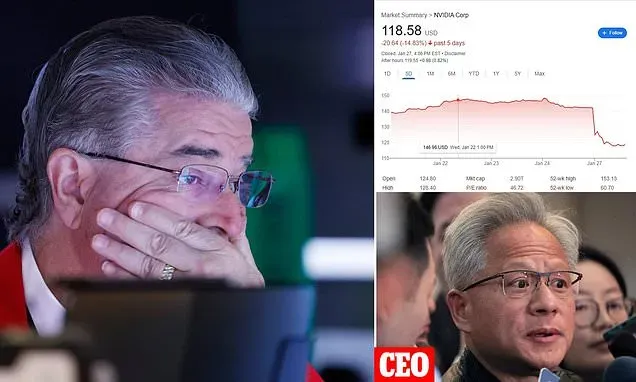Nvidia stock drops have become a focal point in recent stock market news, as investors react to the company’s significant losses amid a turbulent economic landscape. The introduction of new tariffs by the White House has only compounded the challenges for Nvidia, which is facing fierce competition from China’s DeepSeek, a company that recently unveiled a more affordable AI generative technology. This week, Nvidia’s market performance took a hit, resulting in a staggering $513 billion loss in market value, raising alarms over the sustainability of its investments in advanced AI processors. With the broader market experiencing a downturn, these developments highlight the precarious position of Nvidia within the tech sector. As analysts evaluate the implications of these events, the focus remains on how Nvidia can adapt and recover from such setbacks in the rapidly evolving AI landscape.
The recent decline in Nvidia’s stock value underscores the volatility within the technology sector, particularly as it grapples with rising competition and economic pressures. As tariffs are set to be implemented, the repercussions for major players like Nvidia could be profound, especially given its reliance on the lucrative AI market. With the launch of cost-effective AI solutions by competitors, Nvidia’s position as a leader in generative technology is being challenged, prompting discussions about the future of its market strategy. Investors are now closely monitoring Nvidia’s response to these market dynamics, as well as the potential ripple effects on the stock market as a whole. This situation serves as a reminder of the ever-changing landscape in technology investments, where innovation and market conditions continually reshape the playing field.
The Impact of Nvidia Stock Drops on Market Performance
Nvidia’s stock drops this week have sent shockwaves through the tech industry and the broader market. Following the announcement of tariffs by the White House, investors reacted quickly, leading to a significant decline in Nvidia’s market value. This drop comes as the company faces unprecedented losses due to competition from China’s DeepSeek, which has introduced a more affordable AI model. The market’s reaction to these developments highlights the interconnectedness of geopolitical events and corporate performance, particularly in sectors heavily reliant on international trade and technology investments.
As Nvidia’s stock plunged by 15% over the week, concerns grew that the company may struggle to maintain its dominance in the AI space. The introduction of cheaper generative AI technology raises questions about future investments in Nvidia’s processors, which are crucial for powering advanced AI applications. This situation not only affects Nvidia but also creates ripple effects across the tech sector, as companies like Broadcom and Oracle may face similar challenges. The overall market performance, which saw a decline despite positive earnings reports from companies like Apple, reflects the complexities of navigating a rapidly evolving technological landscape.
Nvidia’s Losses and the Future of AI Generative Technology
The recent losses experienced by Nvidia bring to light the competitive landscape of AI generative technology. As DeepSeek disrupts the market with its cost-effective models, Nvidia’s investment in advanced AI processors is being scrutinized. With the market’s focus shifting towards efficiency and affordability, companies may need to reevaluate their strategies and adapt to the changing demands of consumers and businesses. The implications of Nvidia’s setbacks could lead to an industry-wide reassessment of pricing structures and investment priorities in AI technology.
Moreover, the fallout from Nvidia’s losses may have broader implications for the future of AI development. As companies strive to innovate while managing costs, we could see an acceleration in the adoption of generative AI technologies. This shift could potentially enhance productivity across various sectors, as businesses leverage new algorithms to optimize operations. While Nvidia faces immediate challenges, the overall trend towards more efficient AI solutions could ultimately benefit the market by fostering greater economic productivity and growth in the long run.
Market Reactions to Tariffs Implementation
The impending implementation of tariffs by the Trump administration has significantly influenced market sentiments. As the White House confirmed plans for a 25% tariff on imports from Canada and Mexico, alongside a 10% tariff on China, investors reacted swiftly, causing stocks to reverse earlier gains. This decision has raised concerns about the potential impact on companies like Nvidia and Apple, which have substantial operations in China. The fear is that increased costs from tariffs could lead to reduced profit margins, further exacerbating the challenges already faced by these tech giants.
In the wake of these tariff announcements, market performance is likely to remain volatile. The tech-heavy Nasdaq, which saw a 1.5% rally earlier in the week, ended up down 0.5% by the afternoon as investors weighed the implications of the tariffs. The uncertainty surrounding trade policies can lead to cautious investing behavior, as market participants grapple with the potential for increased operational costs and diminished growth prospects. As Nvidia’s stock continues to fluctuate, its performance will be closely monitored as a barometer for broader market reactions to trade policies and international relations.
Evaluating January’s Stock Market Trends
Historically, January has been a strong month for the stock market, with the Dow gaining nearly 5% and the S&P 500 up almost 3%. However, the recent downturn in major tech stocks like Nvidia poses a unique challenge to this trend. Despite experiencing robust gains at the beginning of the month, the market’s ability to sustain these growth patterns is now in question as investors reassess the viability of tech sectors amid rising competition and geopolitical tensions. Analysts suggest that while January’s performance has been promising, the volatility introduced by Nvidia’s losses could temper expectations moving forward.
The juxtaposition of Nvidia’s struggles against the backdrop of overall market gains highlights the complex dynamics at play. While other sectors, such as utilities and consumer goods, may continue to thrive, the tech industry’s performance remains closely tied to innovations in AI and generative technology. If Nvidia’s stock continues to decline, it could lead to a broader reevaluation of investment strategies within the tech sector. Investors will need to consider not only the immediate impacts of Nvidia’s losses but also the long-term ramifications for AI development and market stability.
The Role of AI in Market Dynamics
AI technology remains a pivotal driver of market dynamics, influencing everything from stock performance to investor sentiment. Nvidia, as a leader in AI processing, has been at the forefront of this movement; however, its recent losses underscore the volatility within the sector. The introduction of competitive AI models, such as DeepSeek’s, presents both an opportunity and a challenge for Nvidia and its contemporaries. As companies explore new AI capabilities, the market may witness a shift towards more cost-effective solutions that could reshape the investment landscape.
Furthermore, the growing importance of AI generative technology in various industries signals a shift in how companies approach technological investments. As organizations increasingly recognize the benefits of AI in enhancing productivity and efficiency, we may see a surge in demand for innovative solutions. This paradigm shift could lead to increased competition among tech companies, compelling them to innovate rapidly. Investors will need to stay vigilant and informed about these developments as they navigate the complexities of a market heavily influenced by advancements in AI.
Understanding Nvidia’s Competitive Landscape
Nvidia’s recent performance is a stark reminder of the competitive pressures facing the tech industry, particularly in the realm of AI. The company’s losses can be attributed not only to emerging competitors like DeepSeek but also to the broader shifts in market dynamics driven by advancements in generative AI. As companies strive to deliver more efficient and cost-effective solutions, Nvidia must adapt to maintain its position as a market leader. This competitive landscape highlights the need for ongoing innovation and strategic planning to navigate the complexities of the technology sector.
Additionally, Nvidia’s experience reinforces the notion that firms must be agile in responding to market changes. With the rapid evolution of AI technologies, companies cannot afford to rest on their laurels. Instead, they must continually invest in research and development to stay ahead of the curve. As Nvidia grapples with its current challenges, the lessons learned will be invaluable for both its recovery and for other companies looking to thrive in an increasingly competitive market.
The Future of AI and Stock Market Investments
The future of AI technology is intricately linked to stock market investments, particularly as companies like Nvidia navigate their current challenges. Investors are keenly aware that advancements in AI have the potential to drive significant economic growth, but they must also be cautious of the risks associated with investing in such rapidly changing sectors. As the market evolves, understanding the implications of generative AI advancements will be crucial for making informed investment decisions. Nvidia’s recent losses serve as a reminder of the volatility inherent in tech investments, compelling investors to consider diversification strategies to mitigate risks.
Looking ahead, the intersection of AI and stock market performance will likely present both opportunities and challenges. As companies harness the power of AI to improve productivity, there may be substantial gains for those able to innovate effectively. However, the competitive landscape will also intensify, necessitating a proactive approach to investment. By remaining informed about technological developments and market trends, investors can position themselves to capitalize on the potential of AI while navigating the uncertainties that accompany this dynamic field.
Analyzing Nvidia’s Position Among Mega-Cap Stocks
Nvidia’s position among mega-cap stocks has come under scrutiny following its recent performance decline. As one of the most valuable companies in the tech sector, its losses have significant implications not only for itself but for the broader market. The 9% drop in Nvidia’s stock marks it as the worst-performing mega-cap company this month, raising concerns about the resilience of tech stocks in the current economic climate. This situation prompts investors to reassess the stability of mega-cap stocks, particularly in light of the ongoing advancements in AI technology and the competitive pressures they face.
Moreover, as Nvidia navigates this challenging period, its ability to regain market confidence will be crucial. The company’s future will depend on its responsiveness to emerging threats and its capacity to innovate in the face of competition. Investors will be closely monitoring Nvidia’s strategies and performance metrics, as any recovery could signal a potential rebound for the tech sector as a whole. In this context, Nvidia’s journey serves as a bellwether for the broader state of mega-cap stocks and their ability to adapt to changing market dynamics.
Implications of Stock Market News on Investor Sentiment
Stock market news plays a pivotal role in shaping investor sentiment, particularly during turbulent times. Recent reports highlighting Nvidia’s significant losses have contributed to a climate of uncertainty, prompting investors to reassess their strategies. As news of tariffs and competitive pressures permeates the market, the overall outlook for tech stocks appears cautious. This environment underscores the importance of staying informed about market developments and their potential impacts on investment decisions. Investors are increasingly seeking insights that can help navigate the complexities of market fluctuations driven by both economic policies and corporate performance.
Furthermore, the reaction to stock market news can often lead to emotional decision-making, which may not always align with long-term investment strategies. As Nvidia’s stock experiences volatility, it serves as a reminder for investors to remain disciplined and focused on their investment goals. Understanding the broader context of market news—such as the implications of AI advancements and tariff implementations—can empower investors to approach their portfolios with a more analytical mindset. By doing so, they can make informed choices that align with their long-term financial objectives, even amidst the noise of daily market changes.
Frequently Asked Questions
What caused Nvidia stock drops this week?
Nvidia stock drops this week were primarily driven by the company’s significant losses, totaling a 15% decline, largely due to the emergence of China’s DeepSeek, which introduced a lower-cost AI model. This raised concerns about Nvidia’s future market performance and its ability to maintain substantial investments in AI generative technology.
How do tariffs implementation affect Nvidia stock performance?
The recent tariffs implementation announced by the White House, including a 25% tariff on imports from Canada and Mexico, and a 10% tariff on imports from China, negatively impacted Nvidia stock performance. As a company heavily reliant on its business ties in China, these tariffs raised uncertainty and contributed to Nvidia’s stock drops.
Are Nvidia losses impacting the overall stock market?
Yes, Nvidia losses are impacting the overall stock market. Despite the broader market showing some resilience, the significant decline in Nvidia’s stock value—over $513 billion in market capitalization—has created a ripple effect, leading to concerns about the sustainability of investments in AI technologies across the sector.
What implications do Nvidia stock drops have for AI generative technology investments?
Nvidia stock drops signal potential challenges for future investments in AI generative technology. The introduction of cheaper AI models by competitors like DeepSeek raises questions about the continued dominance of Nvidia’s processors, which could affect market confidence and investment strategies in AI innovation.
How did Nvidia’s stock react to market performance this week?
Nvidia’s stock reacted negatively to market performance this week, shifting from an early 3% gain to a 3% drop by late afternoon on Friday. This reaction was influenced by broader market volatility and the specific challenges faced by Nvidia due to competitive pressures in AI technology.
What are the market implications of Nvidia’s recent performance?
The market implications of Nvidia’s recent performance include heightened scrutiny on tech stocks, particularly in the AI sector. Analysts are concerned that Nvidia’s significant losses could lead to reduced investment in AI generative technology, impacting not just Nvidia but also other major players in the tech industry.
What other factors contributed to Nvidia’s stock drops besides competition?
In addition to competition from cheaper AI models, Nvidia’s stock drops were influenced by geopolitical factors, including the announcement of new tariffs that could affect its supply chain and market operations, as well as mixed signals from the broader stock market.
How does Nvidia’s stock decline compare to other tech stocks?
Nvidia’s stock decline has been notably severe compared to other tech stocks, making it the worst performer among mega-cap companies. While many tech stocks like Apple and Meta have shown resilience or gains, Nvidia’s 9% drop this week stands out as a significant loss in market capitalization.
| Key Points | Details |
|---|---|
| Nvidia stock drops | Nvidia’s stock fell significantly, losing 15% of its value since last Friday, amidst competition from a cheaper AI model introduced by China’s DeepSeek. |
| Market Reaction | All three major indexes (Dow, S&P 500, Nasdaq) experienced declines by late afternoon on Friday, reversing earlier gains. |
| Impact of Tariffs | The announcement of new tariffs by the White House contributed to the market drop, with significant impacts on companies like Apple and Nvidia. |
| Comparison with Other Companies | Nvidia’s market value loss ($513 billion) was greater than the entire market cap of Novo Nordisk, Europe’s most valuable public company. |
| Historical Context | Despite Nvidia’s losses, January historically has been a strong month for the stock market, with potential for positive returns. |
| Future Outlook | Analysts suggest that advancements in AI productivity could enhance overall market performance, even amidst Nvidia’s struggles. |
Summary
Nvidia stock drops have been a significant concern in the market recently, as the company faces unprecedented losses due to competition in the AI space and new tariffs affecting major tech players. The introduction of a cheaper AI model by China’s DeepSeek has raised questions about Nvidia’s future investments in its technology, leading to a sharp decline in its stock value. Despite these challenges, the overall market has shown resilience, with historical trends indicating that January could still yield positive results.








